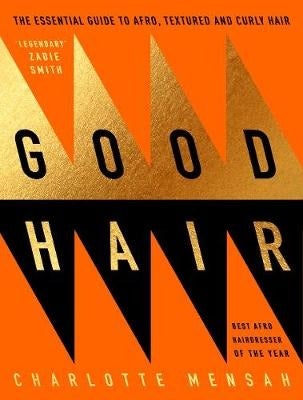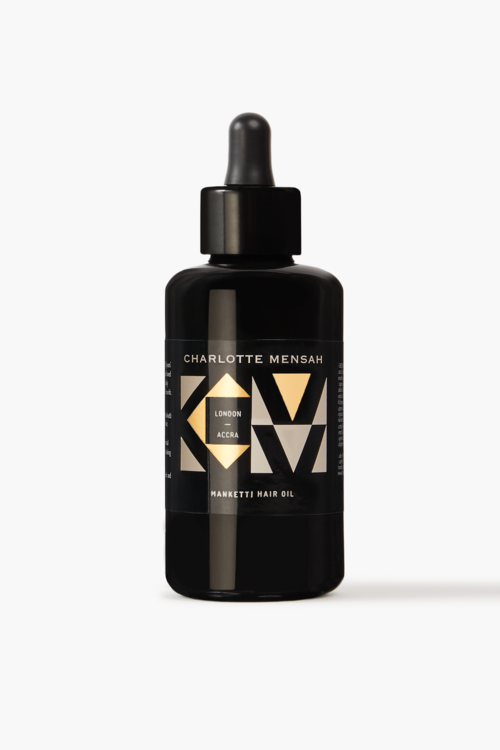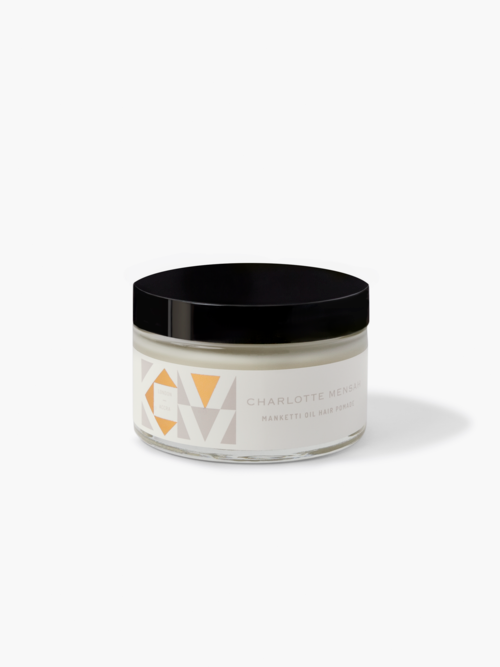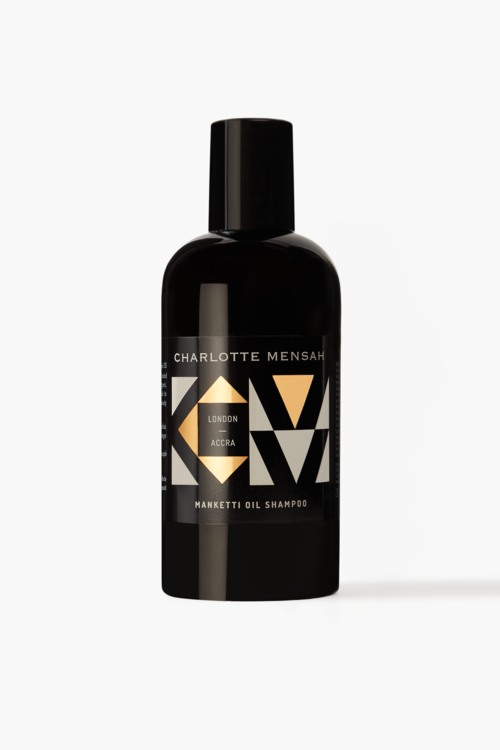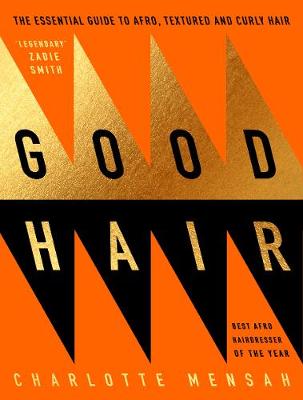Embracing Natural Hair? This Book Is Your Bible
Photo courtesy of Charlotte Mensah.
Charlotte Mensah is a legend in the natural hair industry. With a career spanning almost three decades, the British-Ghanaian hairstylist has won countless accolades, including Afro Hairdresser of the Year (which she's scooped three times), and her skills are in constant demand across the world. She counts Erykah Badu, Michaela Coel, Janelle Monáe and Chimamanda Ngozi Adichie as clients and friends, and her work has been featured in Refinery29, Vogue, ELLE, Harper's Bazaar and Tatler.
Mensah's love of hair and its maintenance developed when she lost her mother at the age of 13 and had to assume the responsibility of helping her younger sister with her hair. She began her foray into the world of professional hairstyling in the 1980s, honing her skills at Splinters under the eye of Winston Isaacs aka the godfather of British afro hairdressing. In 1999, with funding awarded by The Prince's Trust, Charlotte opened the Hair Lounge on Notting Hill's Portobello Road, offering a wide range of unique treatments for afro and multi-textured hair, including salt scrubs, hair steams and a plethora of hair products, such as her Manketti Oil Luxury Hair Care range. In 2018 she was the first Black woman to be inducted into the British Hairdressing Hall of Fame.
AdvertisementADVERTISEMENT
This month, Mensah adds author to her impressive CV with her debut book, Good Hair: The Essential Guide to Afro, Textured and Curly Hair. In it she shares her story from apprentice to business owner and offers practical, expert advice, nourishing recipes and maintenance tips for Black hair.
Ahead, Refinery29 speaks to the hairstylist about her own hair journey, the challenges she faced growing up, why Good Hair is needed now more than ever, and whether she thinks the haircare industry is improving for Black women.
Firstly, congratulations on Good Hair. It's so exciting! Why was it so important for you to write this?
It’s so needed at this time, and it’s important because in the world we live in, we’ve always been told to live by European beauty standards. It’s given us an idea that our hair only looks good straight. Years ago, you couldn’t even get a job if you had any kind of natural hair. It was seen as political. There was no way you could walk in with locs or braids. So it’s important for us to have an understanding of why our hair is the way it is. This book is to share with you the education about who we are culturally, and to really give an understanding and knowledge of all the hair types. It’s for everyone who has hair, understanding that how we treat our hair is different.
It's definitely timely. What can readers expect to learn from Good Hair?
AdvertisementADVERTISEMENT
The book has lots of different parts to it, it’s not just hair. It’s everything from my inspiration, education, my culture and self-belief. It’s here to empower you but it’s also for us to celebrate, learn and accept our hair. I think we’ve spent many years abusing our hair; we’ve spent years not embracing our hair, hiding it under wigs or braids, or damaging it with heat and straightening. I’ve met with clients who have never seen their hair before because they’ve been wearing wigs. So this book is for everyone who wants to save their hair. There’s a lot of tips and tricks, some insight into my own life and the salon’s community, too.
We can’t wait to delve right in. Can you tell us what your own natural hair journey has been like?
It’s very much been about being versatile. I love fashion and I love changing my hair. I’ve texturised it, cut it into a bob when it’s straight and then blow-dried it so it’s bouncy. But then I’ve had waist-length braids or my natural hair mixed with a couple of tracks of weave for more volume. I love experimenting with my hair. The key thing for me is that I have regular treatments. I’m a big believer of hydrating and nourishing the hair.
Are there any particular techniques you use on your own hair?
I have 4c texture so it’s very fragile and you need to be very careful and gentle. I use a lot of butters and oils to moisturise and hydrate. I have regular trims, too, and sometimes when I don’t want to put anything in my hair, I’ll opt for a two-braided look in a protective style. We all have a journey with our hair, so it’s about knowing how to look after it.
AdvertisementADVERTISEMENT
What challenges did you face with your hair growing up?
I was born in the UK and at 3 months old, I went to Ghana. Everyone in my Ghanaian schools had the TWA: the teeny weeny afro. All of us had short hair. But when I returned to the UK aged 11, everyone had cornrows and relaxed hair. So I turned up with my short hair and got bullied. Everyone was laughing at me and my hair. I was so desperate but no one wanted to be my friend. I was dark skinned, had an African accent and a threaded hairstyle. They thought I was from outer space. It was a horrible stage of my life. I grew to resent my hair and it became a negative in my life.
“
I grew to resent my hair and it became a negative in my life. But I don't have those challenges anymore. I love my hair, I respect it, I embrace it, I appreciate it.
Charlotte mENSAH
”
After my mother passed away, my auntie gave me a curly perm for my 14th birthday. I had curly hair and my hair kept growing, so I loved it. Then I started hairdressing at 16 and this is when I wanted to try everything, like chemical straightening and colour. Then I experienced shedding. I worked at the UK’s first Black hair salon and it was there that I learned how to treat my hair. I don’t have those challenges anymore. I’ve really accepted my hair now and tried not to change it. I love my hair, I respect it, I embrace it, I appreciate it. It’s important because it’s tough, especially when everyone is comparing each other on social media.
AdvertisementADVERTISEMENT
Do you think hair salons are getting better at representing natural hair?
Yes, but there’s still room for improvement. We still have a lot of work to do. Some salons wouldn’t cater for natural hair because they say it takes too long, or they simply don’t want to do it. In Good Hair, I talk about the importance of education. It’s about going on training courses and really taking your time to work with the texture. In London, there are loads of salons with plenty of variety. But if you live outside of London, options are scarce. You walk in, they say you’re from another planet and you can’t get your hair done. And there’s no excuse. There are so many mixed families now, so you should be able to cater to everyone.
It’s important that hairstylists become aware and educate themselves. In this day and age, you can’t turn people out. Everyone should take advantage of that. It’s going to make your salon busier and you want to provide a wide range of options. When I was training at London College of Fashion, we learned about different hair types, but I chose to work at Splinters because I wanted to learn more about my hair. That salon had every type of hair, from kinky and coily to curly. It was a great place to learn and a lovely community to be a part of. It’s important to stay educated on the various different types of hair.
What are the common issues your clients face when they come to you at the Hair Lounge?
AdvertisementADVERTISEMENT
A lot of them come to me because they want to know how to look after their hair. A lot of people don’t know how, after years of chemically straightening it, thinning it in the process. So they turn to wigs, hair extensions or weave. Trying to encourage them to wear their natural hair means learning about their hair and how to keep it in the best condition possible. We have a lot of mixed families come in – European mums with mixed race children who use the same hair products on their hair as they do on their child. They often don’t know how to deal with their child’s hair. So I started a workshop at the salon to help mums deal with their hair and haircare in between salon visits. This is why you go to salons: to learn key techniques, buy tools and the products to maintain hair.
“
It's important that hairstylists educate themselves. In this day and age, you can't turn people out.
Charlotte Mensah
”
What are the common misconceptions about afro, textured and curly hair?
That you can literally get a comb and yank it through. There’s a technique used to brush through our hair. Firstly, you have to have patience. Our hair isn’t going to do what it’s told in 10 minutes. It takes time, according to the density and texture. Treat your hair like a precious pearl or diamond, we really need to learn that. Our hair also needs frequent treatments. Just like your Sunday skincare, you need to give your hair the same attention. Make it a ritual, put some music on and have the mask in your hair for two hours. Textured hair also needs regular trims. A lot of clients run away from this but when you trim it, you give room for new growth. Trimming makes hair look better and curls bouncier, more defined and nourished.
AdvertisementADVERTISEMENT
What advice would you give to someone who is transitioning to natural hair?
Transitioning is a journey and you have to be very patient. It works in stages and it takes time; you don’t get there in a minute. You go through obstacles and you don’t give up. Stick to your guns and make sure you know how to take care of your hair and learn to embrace it. Whatever stage you’re at, don’t get triggered and relax it or do what you were doing before. Speak love to your hair. If you’re not treating your hair right, mentally and physically, it’s going to show. Sleep and eat well. Our diets are incredibly important for hair health; eat lots of green leafy vegetables, fish oils, B vitamins and try not to manipulate the hair too much. When you’re transitioning and you’ve got processed hair and natural hair growth, you have to be ever so gentle with it. So look at it as though it is a process.
Okay so you’ve got to spill the beans on your own hair routine…
I love the Manketti Oil. It’s so hydrating, moisturising and very light. I have this product in every room, even in my car. Some people think I cook with it! But I use it as a multiple use treatment; I rub some into my mid-lengths, then wrap my hair with a silk scarf. I use a conditioner as a leave-in treatment and put it in a spritz bottle so it gives me a nice wash 'n' go look. I also have a new product, Manketti Oil Pomade, a rich, creamy butter which is like hair food that I use for a slicked style, a ponytail, a 'fro or twist out. Then, I braid out.
AdvertisementADVERTISEMENT
What conditioning treatments would you recommend?
A good oil and brilliant conditioning shampoo. I love cleansers, rich, creamy conditioners and the right tools. Steam treatments, which we provide in the salon, are one of our most requested. Your hair is so deeply conditioned afterwards as the steamer opens the cuticles, so it allows the product to slowly enter the hair shaft and soften the hair.
Which treatments would you recommend for heat-damaged hair?
Steam. Give the hair a break. When your hair is broken from heat damage, that’s the hair telling you it’s tired and fed up, so you need to stop. Give your hair a detox. Lock away the tools and really think about how you can return to your roots. How do you return to curly? You can do this slowly by using roller sets as it’s still going to smooth the hair but not with so much heat. Or you can give yourself the big chop, just chop it all off. Learn to work with your texture, find the right haircut that suits your hair type and face shape — that makes all the difference. You can wear it in its natural state.
“
You need to fall in love with your hair. You need to believe that you have good hair.
Charlotte mensah
”
Do you have any advice for young girls worried about their natural hair?
You just need to fall in love with your hair. You need to believe that you have good hair. Everyone has good hair. The key is to know how to look after it, care for it and know which products to use. By respecting it, loving it, appreciating and embracing your hair. All hair is good.
AdvertisementADVERTISEMENT
What has been the best advice you’ve picked up along the way?
One of the pieces of advice that I really, really love is that you should keep going and don’t look back. The reason why I love that is because we compare a lot, especially in the life we’re living in, in your career for example. You beat yourself up because you’re not enjoying your success. I love that quote so much because if you’re driving and you keep looking in the rearview mirror, you’re going to crash. Keep looking forward. What’s behind you is done. Stay in your lane. Pick yourself up and keep going. It’s all about self-belief and motivation, and any challenges you face are there to motivate you and get you ready for the next lesson.
Good Hair: The Essential Guide to Afro, Textured and Curly Hair will be published by Penguin Books on 29th October. It is available at Amazon and Waterstones.
Refinery29's selection is purely editorial and independently chosen – we only feature items we love! As part of our business model we do work with affiliates; if you directly purchase something from a link on this article, we may earn a small amount of commission. Transparency is important to us at Refinery29, if you have any questions please reach out to us.
AdvertisementADVERTISEMENT







